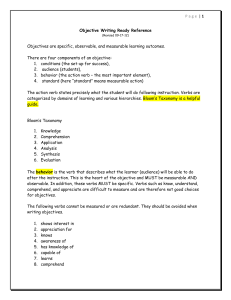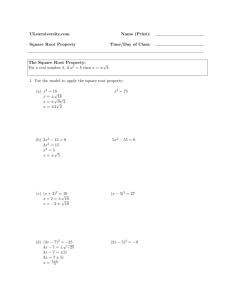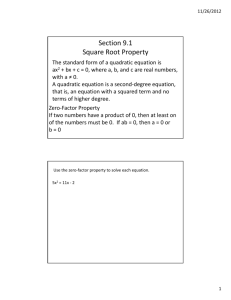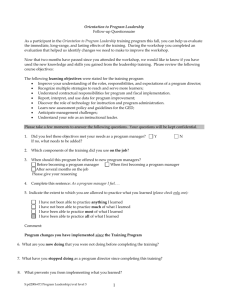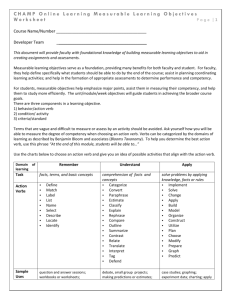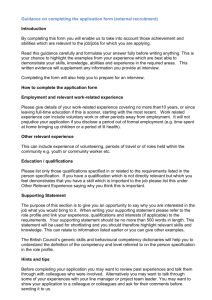HOW TO WRITE COURSE LEARNING OUTCOMES FOR YOUR
advertisement
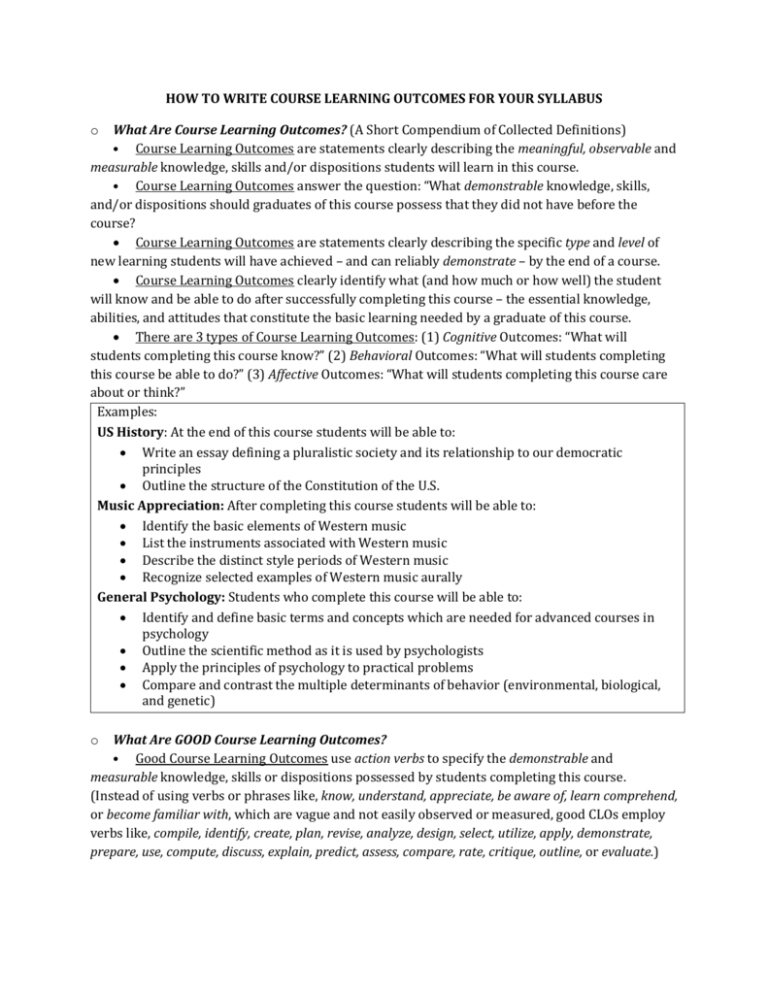
HOW TO WRITE COURSE LEARNING OUTCOMES FOR YOUR SYLLABUS What Are Course Learning Outcomes? (A Short Compendium of Collected Definitions) • Course Learning Outcomes are statements clearly describing the meaningful, observable and measurable knowledge, skills and/or dispositions students will learn in this course. • Course Learning Outcomes answer the question: “What demonstrable knowledge, skills, and/or dispositions should graduates of this course possess that they did not have before the course? Course Learning Outcomes are statements clearly describing the specific type and level of new learning students will have achieved – and can reliably demonstrate – by the end of a course. Course Learning Outcomes clearly identify what (and how much or how well) the student will know and be able to do after successfully completing this course – the essential knowledge, abilities, and attitudes that constitute the basic learning needed by a graduate of this course. There are 3 types of Course Learning Outcomes: (1) Cognitive Outcomes: “What will students completing this course know?” (2) Behavioral Outcomes: “What will students completing this course be able to do?” (3) Affective Outcomes: “What will students completing this course care about or think?” Examples: US History: At the end of this course students will be able to: Write an essay defining a pluralistic society and its relationship to our democratic principles Outline the structure of the Constitution of the U.S. Music Appreciation: After completing this course students will be able to: Identify the basic elements of Western music List the instruments associated with Western music Describe the distinct style periods of Western music Recognize selected examples of Western music aurally General Psychology: Students who complete this course will be able to: Identify and define basic terms and concepts which are needed for advanced courses in psychology Outline the scientific method as it is used by psychologists Apply the principles of psychology to practical problems Compare and contrast the multiple determinants of behavior (environmental, biological, and genetic) o What Are GOOD Course Learning Outcomes? • Good Course Learning Outcomes use action verbs to specify the demonstrable and measurable knowledge, skills or dispositions possessed by students completing this course. (Instead of using verbs or phrases like, know, understand, appreciate, be aware of, learn comprehend, or become familiar with, which are vague and not easily observed or measured, good CLOs employ verbs like, compile, identify, create, plan, revise, analyze, design, select, utilize, apply, demonstrate, prepare, use, compute, discuss, explain, predict, assess, compare, rate, critique, outline, or evaluate.) o Good Course Learning Outcomes are meaningful. (They identify the essential learning that goes on in this course. Ask yourself what is the basic learning you want students to achieve in this class.) Good Course Learning Outcomes are measurable. (They identify learning that can be assessed, preferably with more than one kind of assignment or test.) Good Course Learning Outcomes are distinctive. (They identify the new learning specific to this course. Thus, they should identify the most complex and highest order learning going on in this course.) Good Course Learning Outcomes are aligned/consistent with the learning outcomes or goals of the department or college. (What departmental or college learning outcomes or goals does this course support or advance?) Good Course Learning Outcomes are paired with Learning Activities in the Course that allow the students to achieve the Course Learning Outcomes and allow teachers to assess this achievement. (How & where will students achieve this learning outcome in this course?) o How to Write a Good Course Learning Outcome for your Syllabus. Before you write Course Learning Outcomes, you need to identify and select the essential, distinct, measurable and demonstrable learning you want students to achieve in this course in your department. So, you need to ask yourself and your faculty colleagues what you want students to learn in this course. What is the essential, distinctive, measurable and demonstrable learning in this course that will support or advance the learning outcomes of your department and college? First, select an action verb identifying the specific student knowledge, skill or disposition to be demonstrated. (Choose a verb that allows you to measure student learning. Instead of saying a student should understand a concept, write that they should be able to describe, explain, or identify key elements of the concept. Or select a verb demonstrating students’ ability to comprehend, apply, analyze, or evaluate concepts, or even create new ones. ) Examples: Students completing this course will be able to: Define the social, political, and economic institutions that impact the modern society. Describe the major events and individuals associated with the history of the United States. Apply knowledge of infection control in the maintenance of patient care facilities. Explain the social, economic and political effects of WWI on the post-war world. Second, clearly identify the specific knowledge, skill or disposition you would like students to be able to demonstrate. Examples: Students completing this course will be able to: Discriminate among different Western music styles. Explain music’s place in relation to other art forms. Analyze current research findings in the areas of physiological psychology, perception, learning, abnormal, and social psychology. Distinguish between healthy and unhealthy physical, mental, and emotional patterns. Third, be certain to pair each Course Learning Outcome with one or more Learning Activities in the Class that will allow students to achieve this outcome and permit faculty to measure this achievement.

